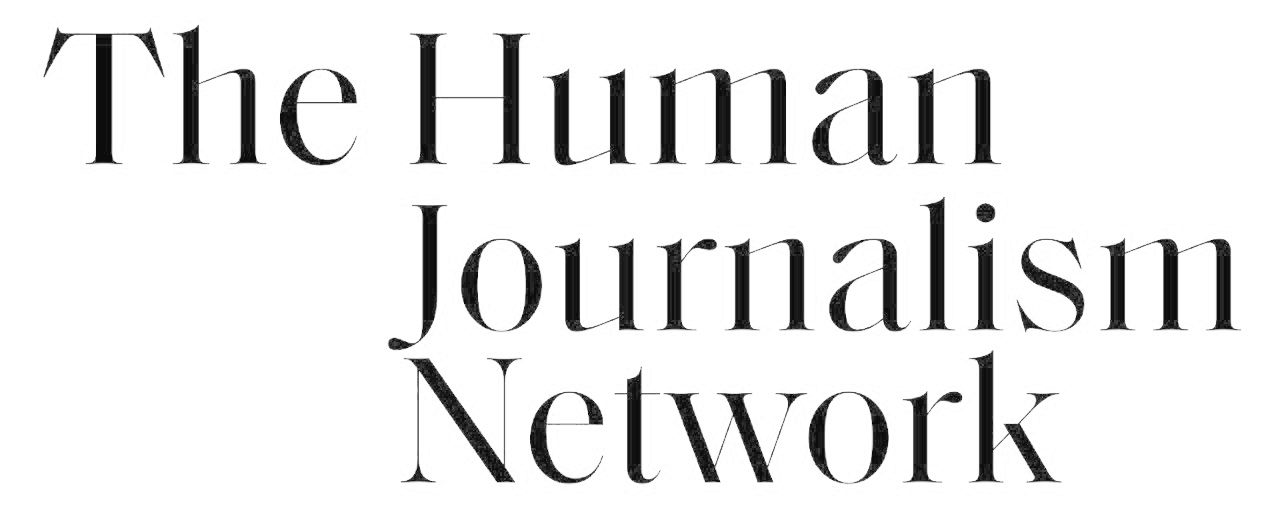Venezuelan women who immigrated to Ecuador see their ventures challenged by their lack of opportunities as migrants.
By Liz Briceño Pazmiño
Ilustration: Daniela Hidalgo
Migration is like knitting: two brackets bind the wool together, and a fabric is built. In the same way, Ida Sandrea, 53 years old, decided two years ago to knit her Venezuelan roots and those of her new home, Ecuador. She and her daughter Andrea Estrella climbed into a truck full of bananas from Maracaibo to Maicao, a Colombian border town, and arrived in Ecuador through an irregular and dangerous crossing.
They are among the more than 440,000 Venezuelans who have arrived in Ecuador in recent years, making the country the fourth-largest recipient of migrants from that land.
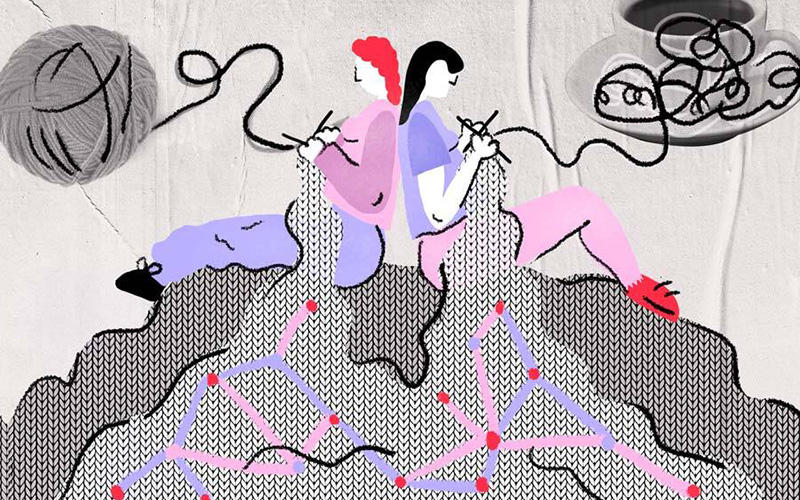
For a while, she received food bags from the Venezuelan government and humanitarian aid organizations. But she got tired of it. “I dreamed of being able to produce again, to have my own money, go to the market, and choose whatever I wanted to buy,” she says, sitting on a bench. Having her own venture was also a kind of therapy to cope with the displacement. “I discovered that in order to heal, I had to get back to work on my knitting business,” she says. That was when Ida Sandrea Crochet, her sewing venture, was born.
The orders started coming in one by one. Sometimes a little jacket, a coat, a hat, or a top. “Crocheted pieces that express your personality,” was the motto on the social media she opened to promote her work.
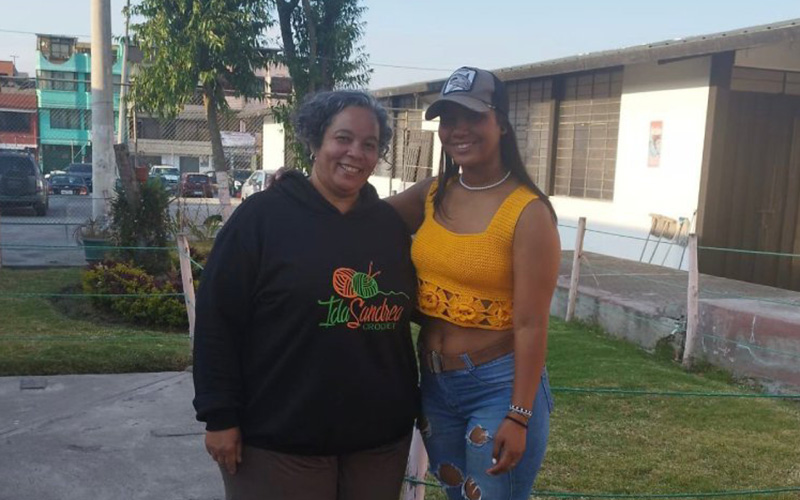
At about the same time, she began to build networks in her community. She started to teach knitting at a community house in Carapungo, a populous neighbourhood in Quito. She became a community leader, teaching other women how to monetize the goods they sold.
One day, she got an order to knit 100 hats in 10 days. “It was beyond my production limit, which was six hats a day, and I decided to contact a group of women with whom I had shared a knitting course to help me,” she recalls. So Ida Sandrea formed Crocheteros Tricolores Sin Fronteras (Borderless Tricolor Crocheteers), an association of Venezuelan, Colombian and Ecuadorian knitters.
What prevented her business from thriving was Sandrea’s lack of registration in Ecuador. At this point, she earns around 300 dollars a month. “Sometimes I make more, sometimes less, because it all depends on the orders, but I’m at a point where my business can’t grow any more,” she explains. Many Venezuelans who have migrated to Ecuador are in the same situation.
Diego Andrade, technical director of the Woccu-USAID economic inclusion project, explains that due to the economic crisis in Ecuador, there is very little possibility for a person to find a job under appropriate conditions.
Woccu-USAID aims to compensate for this situation by helping migrants to develop businesses. It gives entrepreneurs the skills they need to make them sustainable. “That includes helping them get back on their feet emotionally,” Andrade says. The program, he says, has helped 5,000 entrepreneurs. Eighty percent have not only managed to sustain themselves, but already have two to three people working in their employ.
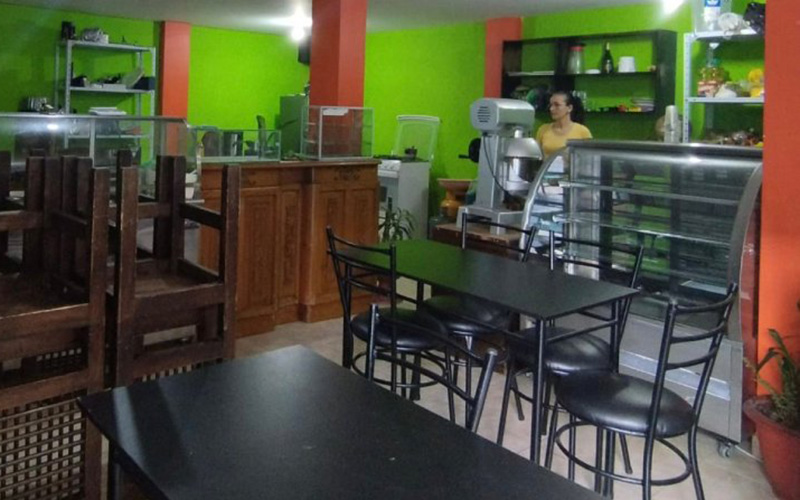
Many of these initiatives do business with each other, boosting the economy, such as Tejedoras Sin Fronteras and Nutri Coffee, a coffee shop in Carapungo opened by Lenis Sosa, a 30-year-old Venezuelan woman who arrived in Ecuador five years ago with her family. Sosa is part of the organization. But there is a challenge: although the Nutri Coffee shop has an oven, a refrigerator and five tables, chairs and a coffee machine, the shutters of the shop are closed. There are no customers. It only does cater services, i.e. food for events.
Between 2018 and mid-2019, the Ministry of Labour counted 2,636 complaints for non-compliance with labour standards and 3,399 employers were sanctioned. When they saw this, the members of Nutri Coffee opted to look for other jobs, and Lenis Sosa was left in charge. Now, she prepares the desserts, manages the clients, and looks for people who are interested in hiring her until she can regularize her situation.
“We thought that we could work in the name of an Ecuadorian colleague, but she could be sanctioned if they discover that we don’t have papers and that we work for her,” says Sosa. The only person who helps her with the cafeteria is Ida Sandrea, whom she met at the Casa Comunal de Carapungo. They became good friends, so Sosa suggested to Sandrea that she set up a small shop window in the cafeteria to sell her knitwear.
Giovanni Bassu, representative for Ecuador of the United Nations High Commissioner for Refugees (UNHCR) explained in an interview for GK that it is an opportunity for Ecuador that the Venezuelan migrants are young because they are considered for jobs: 45% are aged between 26 and 35 and 23% have a higher education degree.
Since September 2022, Venezuelans who immigrated to Ecuador and don’t have a regularized migration status had a new chance to get their paperwork in order. “It is one of the greatest desires of thousands of Venezuelans: to be able to access justice, a job that offers them the benefits of the law, obtain loans, enter the banking system, or obtain a RUC from the Internal Revenue Service,” explains Karina Ponce of Mega Mujeres, a feminist organization.
The process, which is still ongoing, is divided into three phases. In the first phase ―which includes only those who entered legally― it was expected that around 324,000 people from the Caribbean country would register, however, according to the Foreign Ministry, only 86,500 people did.
But Ida and her daughter Andrea entered Ecuador through a clandestine passage – a trocha. “It was the time of the pandemic and all the borders were closed,” she recalls.
As it was not a regular entry point, neither Ida nor her daughter could benefit from the regularization process. They had to wait for the third phase, which began on 17 February. When it is completed, UNHCR estimates that many of the almost 500,000 people who are part of the Venezuelan diaspora could be regularized in Ecuador.
Ida Sandrea knows that having entered Ecuador through a trocha has been the biggest setback of her life. “But there was no other way, if I used that money to get passports, I would have stayed there, with a travel document that I couldn’t use for lack of money,” she explains. “I did what I had to do,” she says. “Opportunities are scarce there, and threats abound.”
Lenis’ thin, white face is streaked with expressive lines of anxiety about the state of her shop. The catering service allows her to have the income to pay for the place and for her to earn a salary. “But I know we are missing out on a lot of money by not being able to open every day”.
Approximately, they were earning around $50 a day. However, as they did not have an RUC, the tax identity document, which states that it is a company owned by the four women, the project has stopped, and they must work on a reduced basis until they are able to regularize their business.
These are precisely the major difficulties faced by migrants with their enterprises. “The lack of documents and the lack of access to the banking and financial system,” says Diego Andrade. Even if migrants can get seed capital to start their business – as is the case of Lenis Sosa and her partners – “if there is no financial system or entities that are open to finance them, their ventures will simply stagnate or slow down their growth rate”, says Andrade.
Nutri Coffee is already experiencing this effect. As their status is not regularized, the women do not have a bank account either, which makes it difficult for them to get paid. The four members have decided to use the savings account of an Ecuadorian colleague. “But that is sometimes a problem because it makes it difficult to do the accounting for the business, but it’s the only way we can work,” says Lenis Sosa.
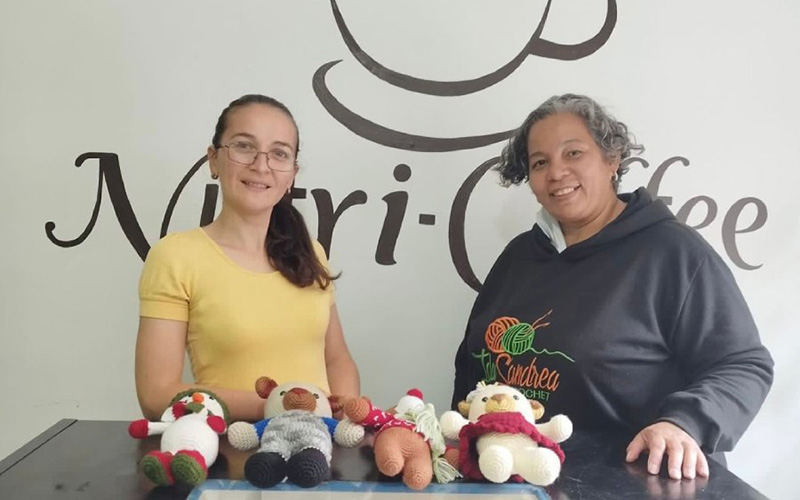
Cristina Bastidas, a migration expert and lecturer at the Universidad Central, says it is a problem that Venezuelan migrants have no access to the banking system because they are forced to carry out all their activities in cash. According to Diego Andrade, there have been cases of Venezuelan citizens in the country who have to rent bank accounts in order to collect their salaries.
Ida Sandrea looks for someone among her friends who will lend her their bank account in order to collect from her clients. Lenis Sosa emphasizes that it would be crucial for them to have a RUC, because the companies they work with ask for an invoice, and sometimes they miss being hired because they can’t provide one.
She says that for her, having a RUC goes further than just getting hired: she wants to feel that she’s contributing with her work to the country that welcomed her and is home to her children, who deserve to feel part of the society.
Sosa entered the regularization process because she entered Ecuador through a regular passage. In September, she entered her and her family’s registration and data verification at Migration. She has already been granted the Virte, a temporary visa for Venezuelans. Now she is awaiting an appointment at the Civil Registry to obtain her ID card.
“If my husband and I can complete the process and get the visa, the business could start; besides, he would stop selling on the streets and would be able to help me,” she says. However, until they have the ID, this will not be possible. For now, though, it is enough for her to be hopeful that this will happen.
On the other hand, Ida says that as soon as she has her Ecuadorian ID card, she will take out a loan to expand her business, obtain a RUC and pay taxes. For her, it is important to feel part of the Ecuadorian social fabric. “Maybe I can’t contribute much, but I want to do my part,” she says.
Point by point, Lenis Sosa and Ida Sandrea knitted a bond that made them a family, and both hope that the doors of Nutri Coffee will open so they’ll be able to sell their goods: Lenis Sosa, her desserts; Ida Sandrea, the ornaments she longs to put on her booth at the entrance of the coffee shop.
This story was originally published in GK (Ecuador) and is republished within the Human Journalism Network program, supported by the ICFJ, International Center for Journalists.
Liz Briceño Pazmiño (Ecuador, 1989). A journalist who has covered economic and consumer issues in the European Union. She covers unaccompanied migrant minors and forcefully displaced people in Ecuador.
